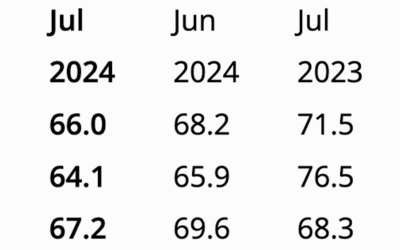National Financial Literacy Month: The importance of financial education
National Financial Literacy Month: The importance of financial education

Financial knowledge goes hand in hand with achieving better personal financial outcomes over one’s lifetime. It is little wonder that financial advisors consider education to be one of their top priorities in working with clients.
April 2024 marks the 21st anniversary of National Financial Literacy Month, “a time dedicated to empowering individuals with the knowledge and skills necessary for sound financial decision-making,” notes Money Fit.
Many federal and state agencies host educational initiatives to mark the month, but “the scope of participation is broad, encompassing a diverse array of activities designed to educate people of all ages,” says Money Fit.
Why is financial literacy important?
Doug McMillon, CEO of Walmart, and John Hope Bryant, founder of Operation HOPE, wrote an article in 2022 for Time magazine that advocated for promoting financial education:
“Even as our country continues to move past the worst effects of the COVID-19 pandemic, supply chain issues persist, there is growing inflation, labor and wage pressure, and rising interest rates. While Americans work to make sense of all this—and plan around it—lack of financial literacy makes it difficult for many. Over the long run, this lack of knowledge puts the American Dream at risk for millions. We believe the private sector has an opportunity and a responsibility to help address this by providing employees, families, customers and communities with increased access to financial education.
“There’s a big need for this kind of effort. Today, only about one-third of Americans have a working understanding of interest rates, mortgage rates and financial risk, according to the Financial Industry Regulatory Authority (FINRA). And this measure of financial literacy has fallen 19 percent over the past decade.”
Several studies cite other compelling statistics:
- Lack of basic financial literacy is “estimated to have cost Americans $415 billion in 2020 alone,” according to a National Financial Educators Council (NFEC) survey from 2021.
- A 2023 survey by CNBC reported that “three quarters of working Americans (74%) say they are stressed about their personal finances. …” The same survey found “more than half of Americans (61%) consider themselves to be ‘living paycheck to paycheck.’”
- According to FINRA’s research, people with higher financial literacy were more likely than those with lower financial literacy to do the following: 1. Spend within their means, with income exceeding outflows. 2. Set aside adequate money for emergencies. 3. Take steps to actively plan for retirement income.
It should be noted that socioeconomic factors play a big role in the surveys informing many statistics about financial literacy. It is a “chicken and egg” question on whether financial literacy drives economic/educational status or the opposite. More likely, it is a combination of the two.
Stages of financial education
It seems to me that financial education develops over several stages, from foundational concepts to advanced strategies. The following broad categories offer a brief overview of the types of areas people might encounter on their journey to financial literacy:
Financial foundation: Learning basic financial concepts such as the importance of savings and compound interest, the effects of inflation, safeguarding personal information, and sound spending habits.
Early financial planning: Mastering more complex financial concepts such as how to manage debt (including educational debt), establish credit and use credit responsibly, navigate benefit plans, contribute to a retirement plan, and formulate a realistic budget.
Wealth building: Comprehending strategic financial decisions such as buying property; evaluating mortgage options and insurance coverages; managing household cash flow, emergency funding, and tax planning; maximizing prudent wealth accumulation (qualified and nonqualified accounts); setting up a living will; and planning for the needs of any dependents.
Retirement planning: Understanding concepts that will affect your ability to retire such as investment planning and allocations related to retirement income streams; advanced strategies for tax management and required minimum distributions (RMDs); Social Security, Medicare, and long-term care options; legacy and trust planning; charitable giving strategies; and funding of a desired retirement lifestyle.
Financial advisors can play an important role in guiding and educating people—and their family members (including children)—in these areas and many more. Virtually all of the financial advisors we have interviewed for Proactive Advisor Magazine consider financial education to be one of their top priorities in working with clients. One advisor we interviewed put it this way: “I believe that all people are fully capable of making sound decisions—even in the complex world of high finance—if they learn important financial concepts and can clearly grasp the implications of the choices they face.”
When educating clients, advisors often discuss the following important financial themes, among others:
- The significance of clients understanding their relationship with money from a behavioral finance perspective.
- The importance of goals-based, “holistic” financial and investment planning.
- Why understanding diversification, market cycles, and investment risk management is crucial, especially for clients nearing or in retirement.
- The “power of compounding” and how it relates to the mathematics of bear market portfolio losses and subsequent recoveries.
- Why the “sequence of returns” is a critical concept in helping clients plan for retirement income.
How advisors can deliver investment solutions consistent with educational themes
In our interviews with financial advisors, many have told our publication that working with select outsourced investment firms can tangibly help in delivering solutions consistent with the educational themes previously mentioned. They cite the benefits of using managed accounts and the services of third-party investment managers who can provide strategy solutions emphasizing strong diversification, responsiveness to changing market conditions, and risk management.
Tara Nolan is a co-founder of Nolan Financial Partners, a full-service financial-planning and advisory firm located in Colorado Springs, Colorado. She is an entrepreneur, financial advisor and coach, professional speaker, author, and Air Force pilot.
She says that providing financial education and communicating her firm’s overall planning philosophy, as well as its culture of “transparency and authenticity,” has been an essential driver of the firm’s growth.
She also says that for most clients’ investment plans, her firm uses the services of third-party investment managers who employ rules-based and algorithm-driven strategies. These strategies, she adds, “are designed to adapt to changes in the market environment and the relative strengths and weaknesses of different asset classes and sectors.”
She continues, “The benefits of this approach include downside protection for client portfolios while seeking competitive returns, mitigating sequence-of-returns risk for those near retirement, and the behavioral benefit of having an investment plan built for the long term—one that helps alleviate emotional ups and downs for clients and increases the likelihood that they will stick with their plan. As we look at the entire approach for a client, active money management adds value and builds synergy—that’s where success lies. Like everything we do, it is all about empowering clients and helping them build a sense of control over their money and their financial futures.”
 One Delaware-based financial advisor we interviewed, Robert Ziegler of Heritage Financial Consultants, told our publication, “I consider myself a financial advisor by profession and an educator at heart. My job is to help my clients understand the various major financial aspects of the world that may impact them, as well as the pros and cons of different approaches to handling them. If I’ve done my job well, our clients will understand what I’m recommending and why—and build a sense of personal ownership of their financial plan.”
One Delaware-based financial advisor we interviewed, Robert Ziegler of Heritage Financial Consultants, told our publication, “I consider myself a financial advisor by profession and an educator at heart. My job is to help my clients understand the various major financial aspects of the world that may impact them, as well as the pros and cons of different approaches to handling them. If I’ve done my job well, our clients will understand what I’m recommending and why—and build a sense of personal ownership of their financial plan.”
He adds, “Over the past several years, I have been increasing the allocation of clients’ portfolios to a third-party manager who relies on a rules-based, tactical approach to investment risk management. When their models or indicators suggest that markets could be entering a serious move down, they will either lower market exposure or even go to 100% cash. This worked well during the downturn of February and March 2020. Their philosophy of mitigating market losses is compatible with my education of clients on concepts such as the mathematics of market losses, the time and gains required for portfolio recovery after a bear market, and the sequence-of-returns issue. While a risk-managed approach may not provide the highest returns in a roaring bull market, I believe it can add significant value for clients over full market cycles.”
Mr. Ziegler sums up his practice philosophy well, “Developing sound financial solutions is one part of the equation in guiding clients. Effectively teaching and communicating financial concepts to clients is, in many ways, just as important.”
The opinions expressed in this article are those of the author and the sources cited and do not necessarily represent the views of Proactive Advisor Magazine. This material is presented for educational purposes only.
 David Wismer is editor of Proactive Advisor Magazine. Mr. Wismer has deep experience in the communications field and content/editorial development. He has worked across many financial-services categories, including asset management, banking, insurance, financial media, exchange-traded products, and wealth management.
David Wismer is editor of Proactive Advisor Magazine. Mr. Wismer has deep experience in the communications field and content/editorial development. He has worked across many financial-services categories, including asset management, banking, insurance, financial media, exchange-traded products, and wealth management.
RECENT POSTS









